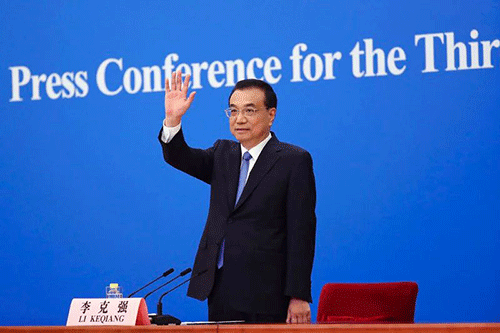BEIJING – China’s gross domestic product (GDP) has increased to 121 trillion yuan (N$32 quadrillion), registering an annual growth rate of 5.2% over the past five years. Over the past decade, GDP has increased by almost 70 trillion yuan at an annual rate of 6.2%.
Premier of the State Council, Li Keqiang, said the revenue increased to 20.4 trillion yuan. Annual grain output remained steady at over 650 million metric tonnes for several consecutive years.
“The total value-added of industry exceeded the 40 trillion-yuan mark, and average yearly urban jobs growth hit more than 12.7 million. Foreign exchange reserves remained stable at over US$3 trillion. These figures show that China’s economic strength has increased significantly,” he said while addressing members at the First Session of the 14th National People’s Congress.
The Premier stated that along with consumer spending hit hard last year, investment also suffered. “We launched several major projects set out in the 14th Five-Year Plan ahead of schedule, expedited the processes of issuing and utilising local government special-purpose bonds, made better use of carryover quotas for special-purpose bonds in accordance with the law, and issued development and policy-backed financial instruments in two batches to replenish the capital for major projects,” stated Li.
He added: “Thanks to eight years of continued efforts, close to 100 million poor rural residents and a total of 832 impoverished counties were lifted from poverty, including more than 9.6 million poverty-stricken people relocated from inhospitable areas. We have thus, once and for all, resolved the problem of absolute poverty in China”.
Moreover, the Chinese government has gone a step further and established monitoring and assistance mechanisms to prevent people lifted out of poverty from relapsing, and took robust action in response to natural disasters and Covid-19 to forestall any large-scale relapse into poverty.
In response to a succession of grave challenges, including mounting protectionism and the Covid-19 pandemic, China has adopted new ways of conducting macro-regulation, and avoided over-reliance on investment as a means of achieving economic growth.
“We employed a wide range of policies, including fiscal and monetary policies, and stayed focused on helping market entities overcome difficulties and grow,” highlighted Li.
During a press conference last week, China’s Foreign Minister Qin Gang reiterated the need to assess the reality on the ground and how the world is functioning, emphasising the importance of maintaining peace while working to provide quality services to the people.
“As the world is undergoing major changes unseen in a century, China will continue to pursue the independent foreign policy of peace, and continue to implement the mutually-beneficial strategy of opening up,” Qin said in opening remarks.
Recently, the Namibian government received members of the 14th Chinese medical team, with health minister Dr Kalumbi Shangula saying the presence of these teams in health facilities has enriched services delivered to patients.
“We believe that the delivery of public healthcare services is enhanced through strong partnerships. The partnership and cooperation between our two countries in the health sector are in line with this belief and ethos,” he stated.
Shangula added: “We stand with the intermediate hospital to fight diseases, and we use traditional Chinese medical therapies for patients to treat their diseases in our clinic”.
To cement this partnership, Chinese ambassador to Namibia Zhao Weiping shared that the two countries are deliberating on ventures centred on exploring and developing new cooperative models.
The Chinese government has been designating medical teams in Namibia to assist with quality healthcare services since 1996.
psiririka@nepc.com.na


